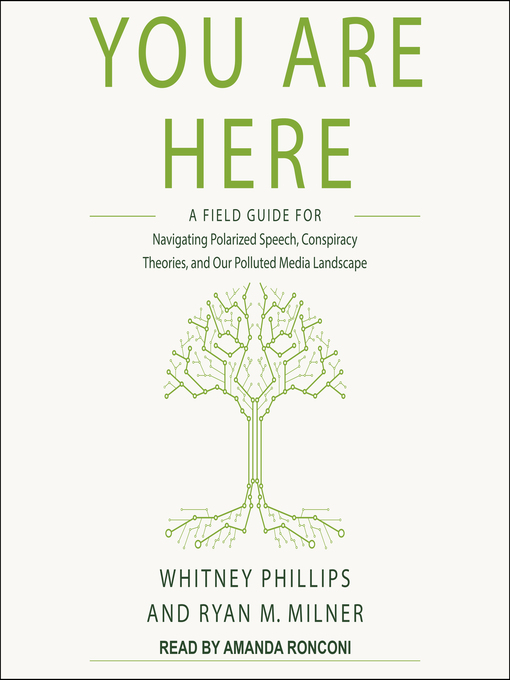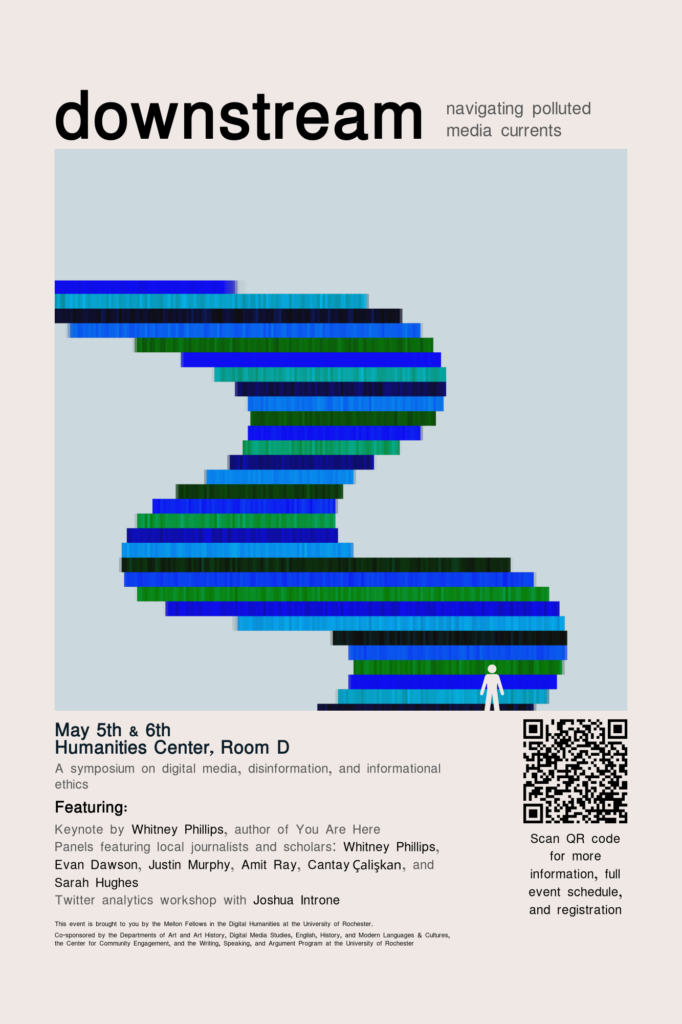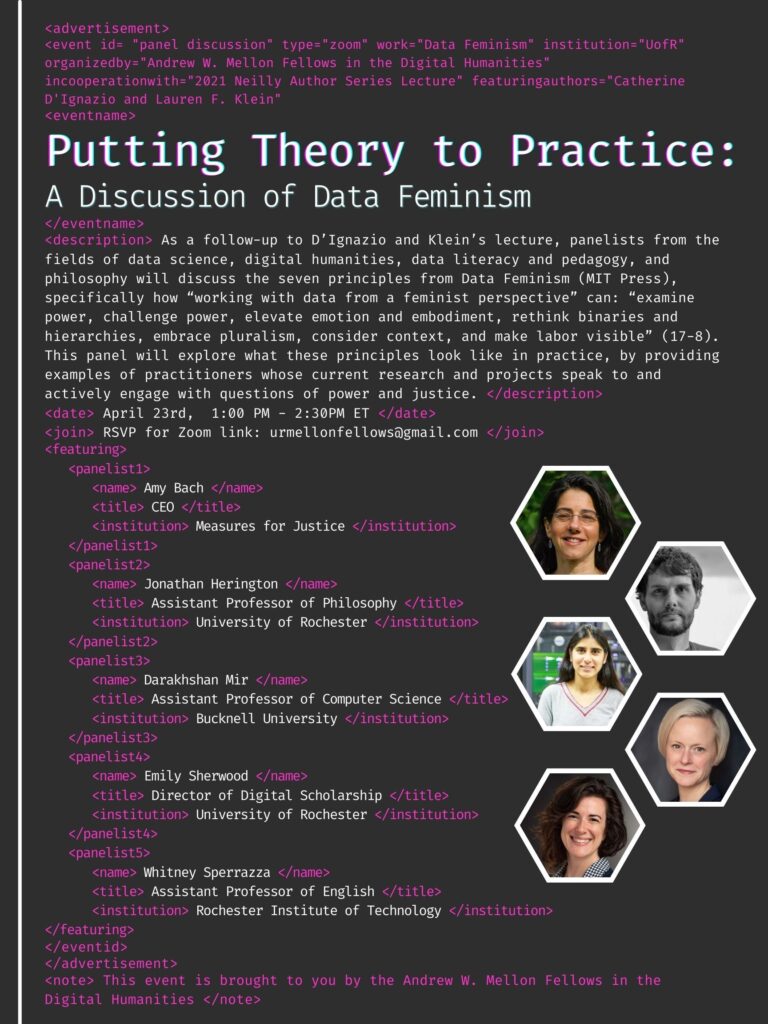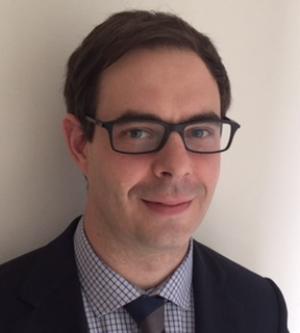The Decline of Democracy and Its Challenges at the Beginning of the Twenty-first Century
A Four-part Series of Online Panel Discussions
Fading Democracy is the title of a series of online discussions about the decline of democracy in Europe, the United States, and around the globe.
The series began in the spring of 2021, with an introductory session on a Wednesday in March and continued with two Friday talks in April and the last on a Friday in May. Each was an independent panel discussion led by the University of Rochester faculty with several guests from eastern European countries. Every panel was followed by a dynamic and sometimes emotional Q&A.
The professors and their guests tackled several heated issues, including the decline of women’s reproductive rights and LGBTQ+ rights, regime-imposed homogeneity, politically charged changes in culture, art, and education, and ecological crises.
The concept for the series came from discussions between Marianne Kupin-Lisbin and Ania Michas, PhD students in the Department of History at the University of Rochester. Since Donald Trump’s election as President of the United States in 2016, the political and economic crises in various parts of the world have intensified and seem to have culminated in 2020 when combined with the global humanitarian crisis of the Covid 19 pandemic. Deviation from democracy and its diminishing reach at the end of the first two decades of the twenty-first century motivated us to develop an interdisciplinary initiative, and to organize a series of Zoom panel discussions about the collective “fading of democracy” in numerous European countries, and in the United States, and its national and international repercussions.
Our goal was, and is, to highlight the historical background and mutual interdependence of the present critical situations in Europe and in the United States. We believe that it is important that the people of the United States understand and examine the mechanisms which brought the reversal of democratic governments and the trend toward authoritarianism.
For example, although we were impressed by the strength and determination of the people of Belarus in their opposition to Alexander Lukashenko’s dictatorship, we have been frustrated with the passivity of the European Union, and the lack of any reaction from the United States, the United Nations, or any other intergovernmental organization designed to sustain democratic governments and protect human rights.
This series wouldn’t be possible without the patronage of Dr. Thomas Devaney, Director of Graduate Studies in the Department of History. He has supported our initiative since its inception at the beginning of the Fall semester in 2020.
We would like to acknowledge the University of Rochester faculty participating in these Zoom sessions, and they are: Doctors Randall Stone and Gretchen Helmke, Tanya Bakhmetyeva, Rachel Haidu, and Thomas Fleischman.
The series was co-organized and co-sponsored by the Department of History, the Skalny Center for Polish and Central European Studies, The Susan B. Anthony Institute for Gender, Sexuality, and Women’s Studies, the Humanities Center, the Art and Art History Department, and the Russian Studies Program.
Fading Democracy – 2021 Series
Introduction: Opening session titled “Fading Democracy”
Thursday, March 11th, 2021, from 12:00 – 1:30 pm
Provided an overview of the current political situation in the world in general and in Central Europe in particular.
First Panel: “Fading Democracy: The Politics of Gender and Sexuality”
Friday, April 9th, from 12:00 to 1:30 pm
Discussed the growing tendency to downgrade the status of issues like women’s reproductive rights and LGBTQ+ rights in countries where democracy is in the process of dismantling, like Poland and Hungary, or in the countries like Russia and Belarus where a democratic system never existed.
Second Panel: “Fading Democracy: Re-negotiating Conflict”
Friday, April 23rd, from 9:00 to 10:30 am
Focused on the work and practices of Polish contemporary artists seeking to understand why right-wing political movements have secured strong support among working-class and lower-middle-class communities outside of the biggest urban centers in Poland, and why the post-1989 transition promoted exclusionary politics towards such communities.
Third Panel: “Fading Democracy: Post-Socialism, the Climate Crisis, and the European Right”
Friday, May 7th, from 1:30 to 3 pm
A discussion of the history, the present, and the future of Eastern European environmentalism and the protection of wildlife. In particular, the panelists explained what has happened to environmentalism in Eastern Europe since the year 2000.
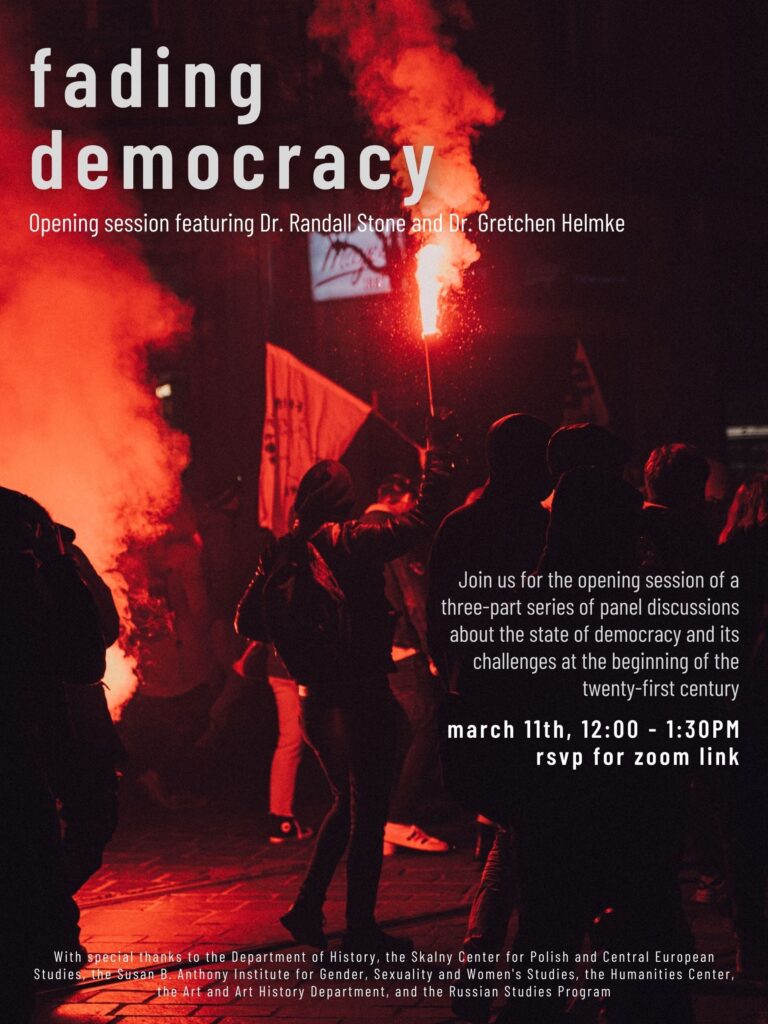
The introductory opening session featured University of Rochester Political Science Professors Dr. Randall Stone and Dr. Gretchen Helmke. The task for Randy and Gretchen’s session was to discuss and outline the state of democracy in the world in general, but in particular on the European continent and in the United States, and about the international repercussions of the collective fading of democratic ideas.
Randall Stone is Chair of Department of Political Science. He has directed the Skalny Center for Polish and Central European Studies for almost 14 years. Stone’s analyses pertain to international organizations and political economy. His articles have appeared in leading political science journals, and he is the author of three books, with the most recent titled Controlling Institutions: International Organizations and the Global Economy, published in 2011. He is currently working on a new book on the interactions between multinational corporations and international institutions.
Gretchen Helmke is the Professor of Political Science, Associate Department Chair, and Director of Graduate Studies. Her research focuses on political institutions, democratic consolidation and erosion, the rule of law, and Latin American politics. Her most recent book, published in 2017, is Institutions on the Edge: The Origins and Consequences of Institutional Instability in Latin America. She is a co-founder of the Bright Line Watch project, which monitors threats to democracy within and beyond the United States (http://brightlinewatch.org/).
Connections: Discussing the Decline of Democracy Across the Globe.
One day before the first Zoom session of the series (Wednesday, March 10, 1:00-2:00 pm), Gretchen and Randy were on Evan Dawson’s show, Connections, on the WXXI public radio station in Rochester, where they talked about the “Fading Democracy” series.
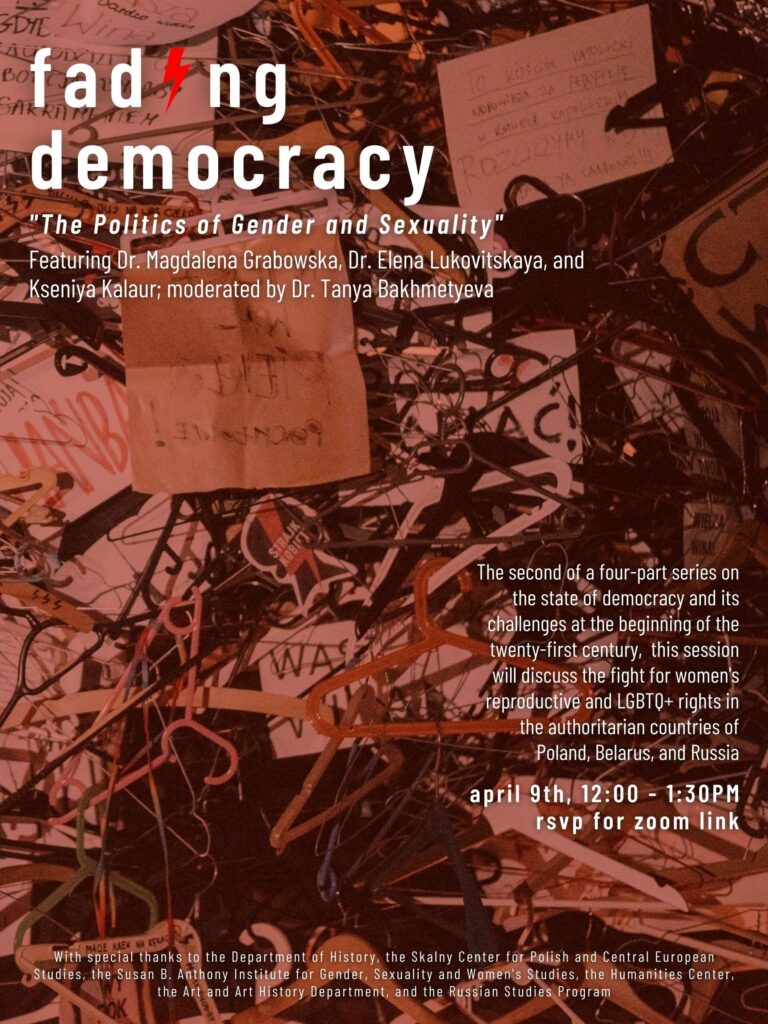
“The Politics of Gender and Sexuality,” was the first panel discussion, featuring Dr. Magdalena Grabowska, Dr. Elena Lukovitskaya and Kseniya Kalaur, and moderated by Dr. Tanya Bakhmetyeva.
Tanya Bakhmetyeva is an Associate Professor of Gender, Sexuality, and Women’s Studies and the Associate Academic Director of the Susan B. Anthony Institute at the University of Rochester. Prof Bakhmetyeva has a wide range of research interests, including masculinity, gender and environment, ecofeminism, and gender and national identity. She is currently working on her next book project which explores political masculinity and natural diplomacy in the Soviet Union.
Magdalena Grabowska is an Associate Professor at the Institute of Philosophy and Sociology, in the Polish Academy of Sciences in Warsaw, Poland. She is the author of the book Broken Genealogy; Women’s Social and Political Activism post 1945 and The Contemporary Women’s Movement in Poland. Recently she co-authored, with Marta Rawłuszko, the chapter Polish #MeToo: When Concern for Men’s Rights Derails the Women’s Revolution, published in The Routledge Handbook of the Politics of the #MeToo Movement, 2020.
Elena Lukovitskaya is a docent at Yaroslav-the-Wise Novgorod State University in Russia where she works on the intersection of sociology, gender studies, and psychology. Her recent publication is “Gender Equality as a Factor of Sustainable Development – Russia and EU Countries Comparison.”
Belarus native, Kseniya Kalaur, is currently a senior at the University of Rochester where she studies Communications and International Relations. During the summer of 2020 she returned to Belarus and participated in multiple protests against the current authoritarian regime. She also worked for the Coordination Council of Belarusian Opposition as a translator and copywriter.

“Re-negotiating Conflict,” was the second panel on contemporary Polish political art with Dr. Rachel Haidu, and her guests Dr. Magda Szcześniak, Dr. Łukasz Zaremba, and Agata Pyzik.
Rachel Haidu is an historian and a critic of modern and contemporary art with a particular interest in Western and Eastern Europe. She is an Associate Professor in the Department of Art and Art History, which she Chairs. Previously she held the position of Director of the Graduate Program in Visual and Cultural Studies. She is the author of a selection of articles and books, among them The Absence of Work: Marcel Broodthaers 1964-1976 published in 2010. For many years she has been interested in Polish art, for example for the Queen Sofia National Museum Art Centre in Madrid, Rachel co-authored a catalog of the works of Andrzej Wróblewski, one of the most important Polish artists of the 20th century. Rachel contributes art critique essays to publications like Art Journal, Artforum, October, Obieg (an international online quarterly magazine published by the Ujazdowski Castle Centre for Contemporary Art in Warsaw), and Texte zur Kunst.
Magda Szcześniak is an Assistant Professor in the Section for Film and Visual Culture at the Institute of Polish Culture, University of Warsaw, Poland.
Łukasz Zaremba is an Assistant Professor in the Section for Film and Visual Culture, at the Institute of Polish Culture, University of Warsaw, Poland.
Agata Pyzik is a Polish journalist and cultural critic. She writes in Polish and English for a number of publications, including The Guardian, The Wire, Icon, Frieze, and Lampa. Agata is the author of Poor but Sexy: Culture Clashes in Europe East and West.
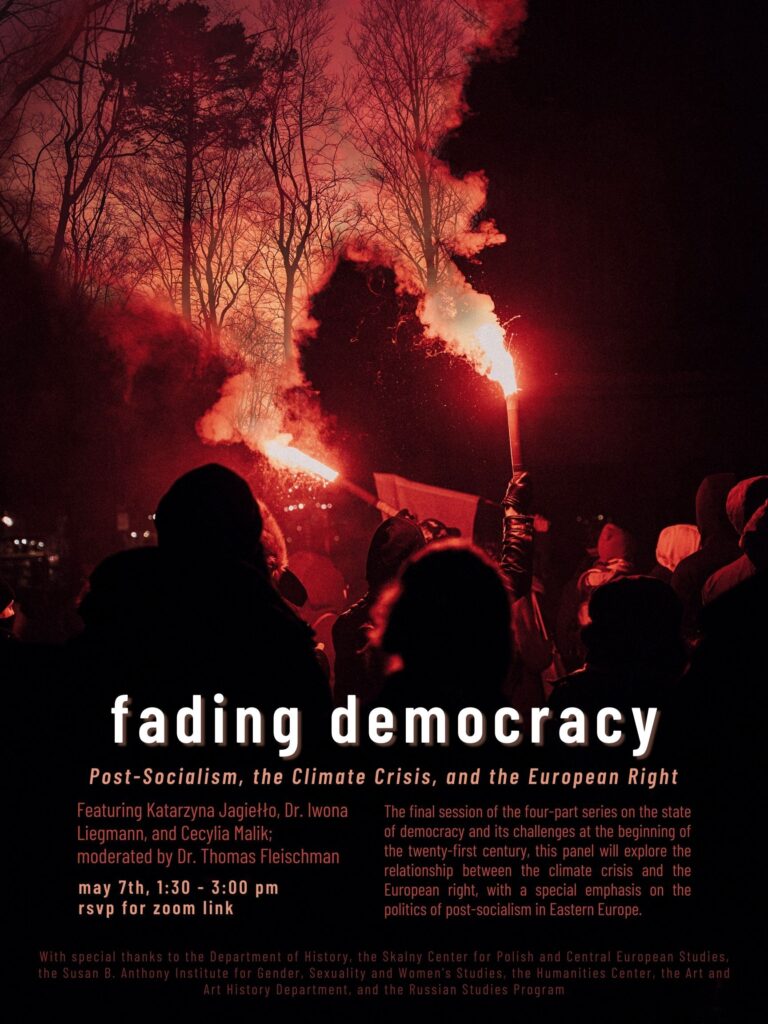
“Post-Socialism, the Climate Crisis, and the European Right,” was the third and last panel of the series, featuring Katarzyna Jagiełło, Dr. Iwona Liegmann, and Cecylia Malik. It was moderated by Dr. Thomas Fleischman.
Thomas Fleischman is a Professor of Modern European History, specializing in the history of Germany, and environmental history and the history of animals. His book on politics, nature, and agriculture in former East Germany, titled Three Little Pigs: East Germany’s Green Revolution, 1945-2014, was published in 2020.
Katarzyna Jagiełło is a politician and Greenpeace international activist. She runs a campaign dedicated to the protection of pollinating insects and co-created Adopt a Bee. She is also a member of the Council for Organic Farming at the Ministry of Agriculture of the Polish Government. Katarzyna was and is involved in opposing the logging in the Białowieża primeval forest and she has acted in many other initiatives. Katarzyna is engaged in protecting seas and oceans and is a diving instructor, translator, and traveler. She graduated from the Leadership Academy for Poland and is involved with the international Greenpeace movement.
Iwona Liegmann is an educator, artist, and environmentalist, with a particular interest in activities designed to improve the lives of animals. She has a Ph.D. in Philosophy and Visual and Performing Arts from the Nicolaus Copernicus University in Toruń (2015). She teaches art at the High School of Fine Arts in Grudziądz. Iwona is a multimedia artist, painter, illustrator, and sculptor. Recently she was awarded a scholarship from the Marshal of Kuyavian-Pomeranian Voivodeship, allowing her to continue her work on a series of portraits of pro-animal activists.
Cecylia Malik is a visual artist, painter, performer, educator, environmentalist, and urban activist. There is a lot to say about Cecylia (she was a guest artist at the University of Rochester in October 2019), and the information included here is just the beginning. Cecylia graduated with a degree in painting from the Academy of Fine Arts in Krakow, followed by postgraduate curatorial studies at the Jagiellonian University in Krakow. She is co-creator of the “Alcon Blue Collective” campaign to defend Krakow’s Zakrzówek green space against development and to protect the Alcon Blue butterfly. She is the initiator of social and artistic actions such as “Polish Mothers on the Stump” against LEX Szyszko, “Białka’s Braids” in defense of the Białka River against regulation, “River Sisters” created together with the Coalition Save Rivers against the construction of a dam in Siarzewo. For the implementation of the artistic action “365 Trees,” she was awarded the title of “Culture Person of the Year 2010” by the 3rd Program of Polish Radio. In 2012, she received a fellowship from the Minister of Culture and National Heritage for the implementation of the project and documentary film “6 Rivers.” Cecylia Malik organizes protests with experts and organizations with sensitivity and effectiveness, at the same time creating them as happenings and works of art in public spaces.
We would like to thank Professors Joan S. Rubin and Stewart Weaver, for their support during the process of and realization of the project. We appreciate the work they did to promote the series and increase attendance.
We would especially like to acknowledge the following people who provided logistics for the project and all the participants, including dealing with finances and other necessary tasks to make the project successful. We thank the following:
- Jacquilyn Rizzo, Administrative Assistant, Graduate Coordinator, and Undergraduate Coordinator, Department of History
- Bozenna Sobolewska, Program Coordinator, the Skalny Center for Polish and Central European Studies
- Jane L. Bryant, Program Manager, Susan B. Anthony Institute for Gender, Sexuality, and Women’s Studies
- Jennie Gilardoni, Administrator, Humanities Center
- Katelyn P. Getchel, University of Rochester History MA student.
Graphics
Marcie Woehl is an Andrew W. Mellon Digital Humanities Fellow and creator of all four promotional posters, which were explicitly designed for the Fading Democracy series. Marcie’s posters convey the political and social anxiety associated with topics discussed during every session.
Project Managers
Marianne Kupin-Lisbin is a PhD Candidate in the Department of History. She is of Slavic descent and her dissertation, titled “The Illusion of Dissidence: The Virgin Mary, Rome, and Local Catholicism in Seventeenth-Century Bosnia,” examines the social and political impact on religious culture and coexistence in the early modern Balkans. She has achieved excellence in teaching; most notably, for several years she has been a teaching Instructor and the Program Coordinator for the Rochester Education Justice Initiative, the University of Rochester’s college in prison program.
Ania Michas is a PhD Candidate in the Department of History and Visual Cultural Studies Program and an Andrew W. Mellon Digital Humanities Fellow. For Ania, “Fading Democracy” was the second interdisciplinary project of social, cultural, and political character that she was involved in during her first year of the Andrew W. Mellon DH fellowship. She wanted to do something pertaining to the distressing situation in her mother country, Poland, and to analyze the populism-based anarchy and democratic breakdown in the countries of Eastern Europe in particular. By developing this series, editing recorded sessions, and placing them on the Mellon DH website, “Fading Democracy” has been transferred even further into the digital humanities project––all interactions, organization, and logistics were carried on digitally during Covid-19 restricted isolation. This is an open-ended project and can be continued and expanded in any required direction.
Marianne and Ania were the co-hosts of every meeting.

